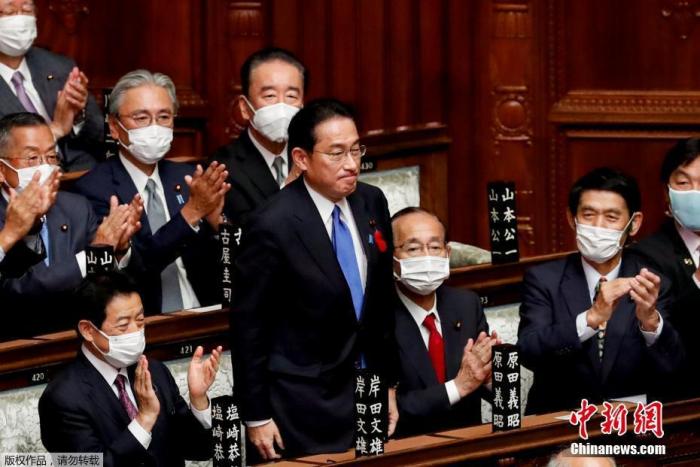Chinanews, October 22nd, report comprehensively, the Japanese House of Representatives election will be voted on the 31st, the ruling and opposition parties are embarking on a fierce election battle.
This rare "short-term election campaign" is considered to be the "life and death battle" of Fumio Kishida. Once the ruling Liberal Democratic Party and Komeito party cannot keep power, Fumio Kishida will become Japan's "shortest-lived" prime minister.
Former Prime Minister Shinzo Abe also took to the streets to canvass for the ruling party and played a crisis card.
Data map: Japanese Prime Minister Fumio Kishida (middle).
The election battle between the ruling and opposition parties intensified
Kishida will go to the fierce battle zone to canvass votes
According to the Kyodo News Agency of Japan, after the release of the results of various media surveys investigating the initial elections of the Japanese House of Representatives, the ruling and opposition parties stepped up on the 21st to win the support of non-partisan people who have not yet decided on the voters.
The Liberal Democratic Party cadres issued a notice to the party entitled "The Situation is Urgent", demanding that they do their utmost to obtain votes.
The trend of the fierce battle zone will determine the overall victory and defeat, and efforts will be made to strengthen election campaigns by investing in cadres.
The Cadet Party believes that the unified election of candidates with the Communist Party is effective, and it intends to implement and strengthen the opposition parties to fight together.
Towards the vote count on the 31st, the election battle intensified.
The Liberal Democratic Party pointed out in a joint notice by Secretary General Gan Liming and Election Countermeasures Committee Chairman Endo Toshiaki that “there is an extremely urgent situation. Many small constituencies present a pattern of one-on-one contests between the ruling and opposition parties.”
Kyodo News’ national telephone survey results show that nearly 30% of the respondents who have not determined the voters in the small constituency.
Including the small constituency where the Liberal Democratic Party is slightly ahead, there are about 70 fierce battle zones, and officials such as Prime Minister Fumio Kishida (party president) will continue to go to the fierce battle zones.
On the 21st, Kishida went to Aichi Prefecture, where the Liberal Democratic Party has a solid support base, and called for "I hope to gather everyone's strength and push for victory."
The Liberal Democratic Party will hold an election strategy headquarters meeting on the 25th as soon as possible to discuss strategies for the end of the election campaign.
The leader of the Liberal Democratic Party, Yukio Edano, rushed to the prefectures of Hiroshima, Okayama, and Aichi, which competed fiercely with the ruling party.
In his street speech, he was aware of the non-partisan crowd and called for support, saying that "there will be a big change in the vote this week."
The Communist Party Secretary Akira Koike said in the capital: "The citizens and the opposition parties are fighting together. They are ready for regime change."
Data map: Former Japanese Prime Minister Shinzo Abe.
U.S.-Japan Alliance
Abe's street speech says "can't lose"
Former Japanese Prime Minister Shinzo Abe also gave speeches on the streets to canvass votes for the ruling party and played a crisis card.
He said that if the opposition Cadet Party takes power, "the Japan-US alliance will end."
Japan’s Asahi Shimbun reported that in a speech on the streets of Yokohama, Abe said that abolishing the Japan-U.S. alliance and advocating that the Self-Defense Forces are unconstitutional are the basic policies of the Communist Party. ".
He said that the Cadet wanted to abolish the peace and security legal system he enacted when he was in power (some of which allow the exercise of collective self-defense rights).
Abe said that Japan and the United States can become a strong alliance because of the legal system for peace and security. Once the legal system for peace and security is abolished, the relationship of mutual assistance that has been clearly formed will become an alliance that cannot help each other. Will end".
Abe also emphasized that under the current international situation, the Japan-US alliance is believed to be strengthened. "Therefore, we must not lose."

